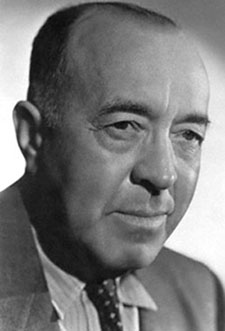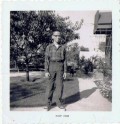What Writing Means to Me
Edgar Rice Burroughs

On Wanting to Write
"That's one thing about being a writer," he said, an enigmatic little smile playing around his mouth, "sooner or later, you use everything you know."
Jim Burke sat on the conveyor, his knees drawn up and his arms folded around them in a position I would have found quite uncomfortable, but he was lanky enough to get away with. It was a Saturday, the day of annual inventory at the Wichita based parts wholesale house, and the employer had paid for the worker's lunch since the tasks that day were "extra-curricular." Because of that, empty and half-empty pizza cartons littered the conveyor at Jim's feet as well as several adjacent work surfaces that normally were used in the process of shipping product out.
I happened to walk by as he uttered these words, and hadn't heard his proceeding comment but presume it may have dealt with one of his experiences and how he would weave it into a story. I was the newbie at the job, and as such somewhat of an outsider although Jim and I worked next to each other in the sales room taking calls from a customer base that included all of the lower forty-eight states. It was a well established fact that he wanted to be a writer and all his co-workers knew it.
At that time, my desire to write was still developing, as it seems to have been doing since my childhood. I can remember those days, my thoughts at times seeming to flow as though being narrated from the pages of a book. They no longer do, but looking back, I realize I now see this ambition in its infancy. It is finally coming into its own, as Jim Burke's had during the time we worked together. And as I mentioned above he made no secret about it.
To the contrary, much of the conversation in our corner of the sales department centered around his ambitions. He had at one point mentioned that in his opinion, Tom Clancy, although celebrated really wasn't that great of a writer, Our supervisor, an erstwhile gentleman named John, and a Clancy fan to boot, pointed out the score; Clancy 12 books published, Burke 0. Jim responded with "Point well taken." But even that lesson in humility hadn't dampened his enthusiasm. And on the day of inventory, he further demonstrated it.
Jim's impromptu and involuntary class seemed less than impressed with his pronouncement. The small group of twenty something's who made up the warehouse crew probably didn't read anything more serious than a job application, and most worked at their job because it required no special skills or formal education. Their response was silence although it was obvious they were hearing what he was saying, and I was able to evaluate that much as I passed by. And determined to succeed, Jim went on a few months later to have one of his own writings picked up by a publisher and printed. It was a short book called "The Twisted Mind of Jim Burke," and although I have never seen it for sale since, (Google failed to find anything) he let me read a copy he brought in to show everyone. The fact that I remember nothing about it save the title reveals it probably didn't resonate with me. But that aside, the statement he made to his unwilling students that day is true. That much I know.

Lessons
"That's one thing about being a writer, sooner or later you use everything you know." The theme Jim outlined was taught by educational instructors long before he espoused it to his listeners. It isn't new, and probably should be second nature to those who endeavor to be successful in the field. Clancy has obviously invested time and effort in learning the subject matter about which he writes, and therefore followed Jim's advice years before he gave it. And any writer who wants to flourish would be wise to do the same.
"Write what you know." These words were uttered by an instructor at a writer's workshop in nearby Emporia. The lecturer was simply pointing out the simplest way of starting to write; by using the stockpile of knowledge, experiences, and occurrences each of us has stored in his or her mind.And all of this leads up to what it means to write to me.
In my life, I have been fortunate, or cursed depending on one's point of view to meet a wide variety of people from many backgrounds and differing cultures as well as a large variety of jobs and work settings. All of these people had their own stories and experiences and what I know of them is limited to the snapshot I hold of the brief time our circles crossed. And I take away from that period, impressions and images that remain a part of my memories. And do these memories simply cycle through my mind without ramification? Well, no they don't They come out of nowhere when some random thought process is at work generating a story. That's how it works for some of those who desire to be storytellers.
Consider for instance Kenny Fleming. I worked with him for a very short span of time a number of years ago. He had several noticeable character traits, but I remember him as being loud, cunning, gregarious and of limited education. His physical attributes suggested a beer-drinking, fried food eating hayseed who rode through life on the coattails and efforts of others. Now in truth, Kenny was good guy, but he's perfect as an image for someone in a story and could serve as the model for a wide variety of scenarios. It's a small thing, but in a fictional story, it can be used as part of the plot, giving an added dimension to the contrivance and make the story more compelling and enjoyable. Or I could talk about Jeff Downs, one of the two people I have known who used a prosthesis to walk. Jeff was a recovering addict who knew well the life on the street level in Wichita. He lost his leg in a hunting accident. There was also Rick Olson, a raconteur in his own right. The stories he relayed sped the passing of numerous slow evenings in the automotive department of a Montgomery Ward store where we worked.
Each of these people are stories in themselves, albeit stories that remain untold for the most part. And furthermore, these accounts probably aren't sufficiently exciting or interesting to attract readers and/or the attention of publishers. But think of stories you have read and enjoyed. Think of the principals as the narrative unfolds and how they act and react. Where did the writer get the inspiration to draw out a character in such a matter. Who was the image in the mind of Dean Koontz when he described Odd Thomas? Or did Stephen King really know or see someone of note to include so many statuesque red-headed women of different names in his various novels? And did Tom Clancy pattern his Jack Ryan and family characters after any real life political family in America?
How about Michael Crichton? Was his character John Hammond in Jurassic Park a clone of someone he knew or perhaps had dealings with. Maybe a mail carrier, or store clerk or patron at a restaurant discussing politics while the writer was eating breakfast provided the first visual image. And who can read Hearts in Atlantis without wondering if the part of the story placed at the university wasn't at least somewhat based on King's own college days. In the hands and minds of a dedicated and fanciful storyteller, even the most mundane daily experience can be brought to life in a way as to leave a lasting impression on the reader. And so if a story is demanding its telling and requires someone like Jeff, or Rick, or Kenny in order to be complete, then one of them or rather the memory of them will step in and serve.

Inspiration
Now any good read has to have characters, but the people who are in the story, who act and interact like performers on a stage in the mind of the writer are only a part of it. They are the Who. The What, the Where, the When and so forth are the rest of it and no properly written story can exist without them. They are the essence with the characters added to give it life. And the inspiration for these is much more tenuous although sometimes connected with the inspiration for the principals.
So where do we get this inspiration? Well, as the instructors recorded at the beginning of this article would say, "Write what you know." What has happened to you or around you that could make a good story? Could the recent recession, rife with job loss, and difficult times be the source of a crime spree story. Tom Clancy and Nelson DeMille used things that could have been ripped from the headlines while Brad Meltzer and Dan Brown expanded on more secretive subjects. But regardless the source, the storyteller must be able to grasp it and make it his own before he can compel others to read it. He must "write what he knows." And he must be able to recognize inspiration rather than to invent it. Stephen King said it best when he said "If you don't have the time to read, you don't have the time or tools to write."


My Own Convictions
Although I wish it weren't so, I find it much easier to read than to write. And I also find myself as time progresses, becoming more discriminating in what I read, in that it seems to take a well written account to hold my interest. If I find my mind wandering while absorbing the written word, I usually give up on the task and find something more to my liking. But even this small indulgence hasn't always been a habit. More times than I can remember I have labored through a story even though it wasn't yielding much of note because I hated the idea of leaving it unfinished.
Nevertheless this has, I feel helped me to raise my expectations for my own work, and maybe that's one reason writing is harder than reading. I cannot publish a hub until I feel I have done all I can to make it as good as possible. Despite this, I occasionally look back at some I've done on this site and cringe at the choice of words or wonder how I could have missed that grammatical error. And I wonder how the reader reacts to that, and then feel a touch of disappointment in myself for what I feel is a substandard offering.
Now I'm not under any illusions that everything I write is going to be loved by all who read it; we all know things simply don't work out that way. Rather, I would be inclined to believe that a relatively small percentage of readers view my work with a high opinion. Still I have to write what is conceived in my mind. I can't write something that I myself wouldn't be willing to read and that is where my motivation originates. My content has to contain substance. There has to be something to pique the interest of readers at least as I visualize them to be. Most readers undoubtedly forget the account seconds or minutes after they've read it, but I also write for those who may recall a word, or a phrase or perhaps a bit more later on, maybe even several weeks or months down the road.
I have to write from the heart. I cannot simply put words on the page from the mind. I am unable to relay an account I haven't had the interest in to research. I try to build the story in the same way a carpenter builds a house, with a firm foundation and something interesting, attractive, and relevant to make the reader keep turning the pages. If this exchange of ideas, concepts, plots, and musings we call writing fail to find lodging in the minds of at least some of our readers, then we are wasting our efforts.
I last saw Kenny Fleming around thirty-eight years ago. Possibly he has passed away by now, although I haven't heard anything about it. I chanced upon Rick about twenty-seven years ago, and last spoke with Jeff in nineteen ninety-three, ten years before I lost track of Jim. Possibly I could run into any one of them on the street and not know who they were. But the fact I have vivid memories prove they reached an inner level in my mind, and therefore become a part of "what I know."
For me the bottom line of writing is that a story is inside and I need to tell it. It is for the love of the craft; of the telling, Some people write for prestige or money and while that may be a part of the reward if the love of doing it isn't there, the reader will know and the writer will never grow to their full potential. I think Thomas Wolfe maybe summed it up when he said the reader reads a story in order to remember it, but the writer writes it in order to forget it.








